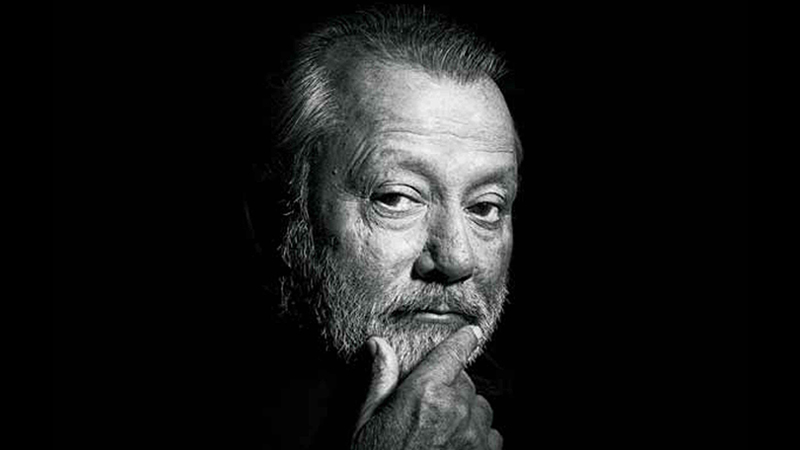
Film. Theatre. Television. Pankaj Kapur has left an imprint (and continues to) across all acting platforms. The multiple National Award winner has presented the audiences with stellar performances in TV shows such as Zabaan Sambhaal Ke, Karamchand, and such films as Maqbool, Raakh, Ek Doctor Ki Maut. As he continues to push the envelope of quality acting across genres, he recently visited the capital to present his play, Dopehri, at the Delhi Theatre Festival, organised by Alchemist LIVE and presented by American Express. Written and enacted by the thespian himself, the one-act play has had the audience enthralled each time the curtain has been raised. We get talking to the gent who has successfully etched out his own niche and an exemplary career of over 30 years, and he shares his thoughts on the art of acting and the scope of theatre.
You are a graduate of the National School of Drama. How did the institute shape you as an actor?
The National School of Drama is largely responsible for the way I became an actor, or the fact that I became an actor. Mr. Ebrahim Alkazi and the staff at that time had a significant role in moulding the impressionable nineteen-year-old me who walked through the gates of the National School of Drama. Those three years were some of my most impressionable days. Obviously because the impressions were positive and my teachers, especially Mr. Alkazi, exposed me to the right stuff at the right time NSD helped cement the base on which I built my career.
The three years at NSD were most enriching for me, especially in terms of the creative exposure I received.
Theatre has given great actors to the industry, but it is still considered a lesser medium. Do you think people have done enough to show their gratitude towards theatre for having given such great talent to the industry?
The number of people who come to see theatre performances has increased. But, we have not had a historical continuation of a theatre tradition in our country (in the modern sense of the term) — we have a tradition of kathanaks and different indigenous forms of storytelling, but that’s a different tangent — we don’t have a tradition of theatre of the sort that Britain has; one with such developments as Shakespeare 500 years ago. Therefore, from whenever the modern theatre started in this country — say in the form the Sanskrit theatre, Bhangvadi theatre, or Parsi theatre (which was an amalgam of the Shakespearean style and the indigenous styles) — to the beginning of the twentieth century to where we have come today, we have come a long way.
Is there hope that Indian theatre will be at par with established international theatre landscapes?
Why not? I already see a lot of improvement in the last thirty-forty years and the percentage of improvement is quite a bit. The only thing is that there have to be more people, institutes, and venues that are conducive to theatrical working.
Even today, most venues are conducive to our generic social functions rather than to theatre conditions. For instance, venues give slots of three-four hours to theatre groups to perform a play. How will they do that? How will they put up their set? How will they do the lights? Which means they have to buy four slots at a minimum. Ideally theatre groups should be able to stay for days together in that place in order to have light rehearsals, dress rehearsals, etcetera.
Now such places need to be built by either entrepreneurs or the Government of India, so that the movement continues to advance at its present pace. Such enterprises should also be managed by people who have a sense of theatre and want to make progress in theatre; and not by individuals who are purely motivated by the commercial aspects of the venture.

Pankaj Kapur performing Dopehri; Image: emirates247.com
Is the lack of interest in theatre because we value the artist more than the art? The crowds aren’t drawn by the desire to witness the thespian arts; the crowds are drawn by the “star-name” associated with the performance.
In today’s world one needs to make a place for themself to be heard or to be seen. That’s a general rule of life that is true for any field, be it an engineer, a politician, an actor, or a doctor. Every individual earns recognition only after they hone their craft. ‘Star’ is a word that is associated with actors because we are in a field in which these words are used. However, the word is starting to permeate other fields as well — the other day I came across someone describing a doctor as a ‘star doctor’. A doctor is a doctor yaar, an actor is an actor yaar. If somebody’s only popular and doesn’t know how to act, I can understand that.
What are your views on majority of the Bollywood industry struggling with the label of being stars yet not actors?
Some of the stars are hugely talented people. They either have not had the opportunity or have chosen to work in a certain manner. But given an opportunity and if they choose to take it up, some of those people can stun you with their performances. I have seen some of them closely, which is why I am saying so. I may be hugely critical of the choices that they make, but that is a different matter. As far as talent is concerned, these people are hugely talented. If directed in a different way, they will come up with a performance that will certainly be worth talking about.
You recently became a grandfather and every day we see pictures of star kids splashed across the newspapers. How do you feel such attention impacts the child in the long-term?
Children should be made to feel as normal as possible. At a very young age, they are not even aware of it. You cannot change the fact that I am me, you cannot change the fact that these are my children, and these are my grandchildren. You need to do whatever best you can and bring up your kids in the most normal manner, so they grow up to be normal human beings.
You used to make an extra effort to protect them from the glamour of it…
This is an individual choice. Some people would like to have their children at the centre of the glamour, so the glamour itself de-glamorises the whole thing for them. Some other may feel that they need to protect them and keep them away from all this. So, there are different approaches.
Your son is now an accomplished actor. What conversation about career do you have with him now, compared to the conversation you had in the early days of his career?
We normally do not have any conversations about work. We prefer to talk about family, emotions, and things to do outside of work. I don’t need to guide him. He’s a mature actor and a mature human being in his own capacity, and he has proved this to his critics and his audiences. If anything, I need to learn something from his generation to stay abreast with the times.
As we doff our hats to the actor par excellence and bid adieu, the COO of Alchemist Live shares, “Delhi enjoys a culture of theatre owing to the presence of National School of Drama (NSD) in the city. However Gurugram posed as a huge opportunity for us this year since the region lacks a platform while there is an apparent enthusiastic theatre audience. We are the very first company to have showcased this appetite in the region and aspire to continue to do the same in the future.”
Disclaimer: Some of the answers have been edited for brevity and clarity.
Featured Image Courtesy: bingehour.com

